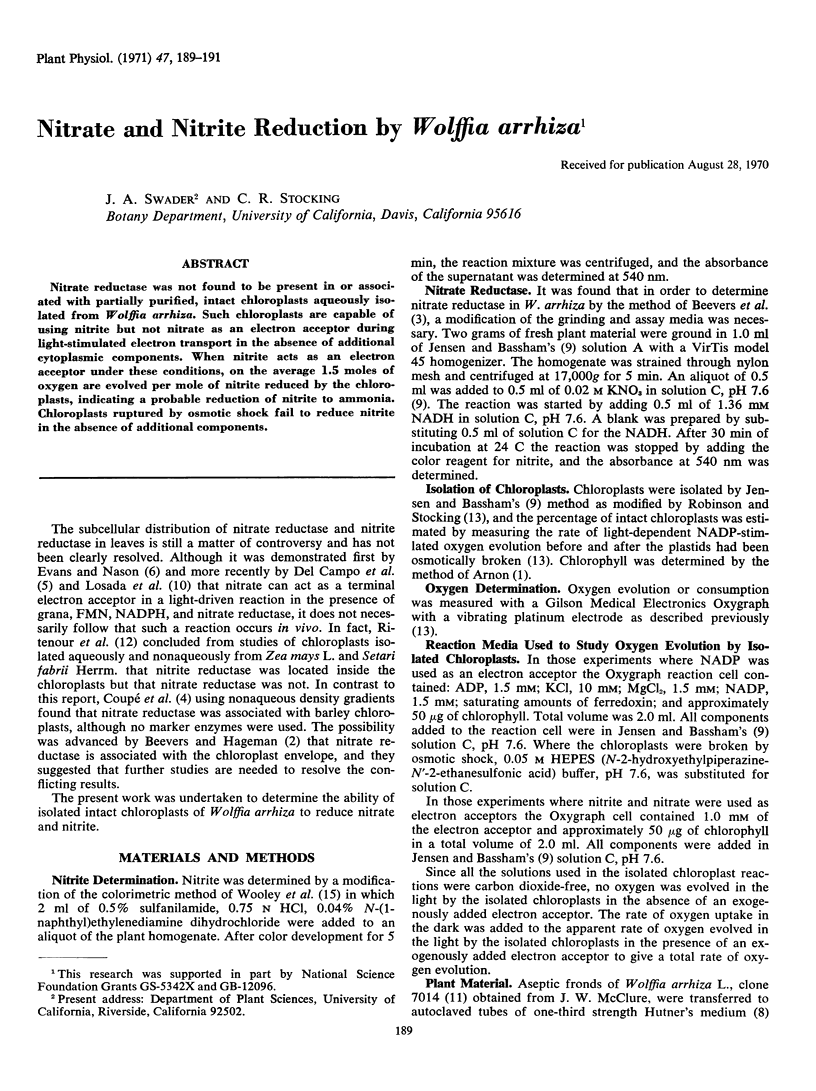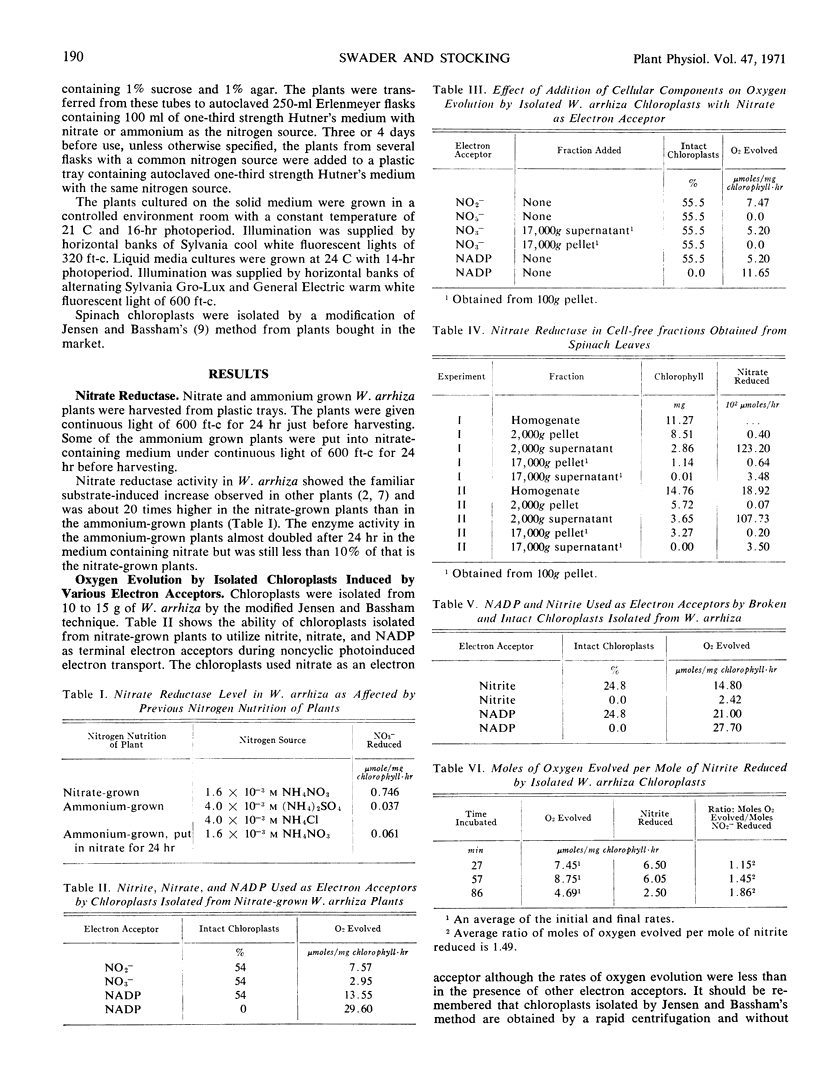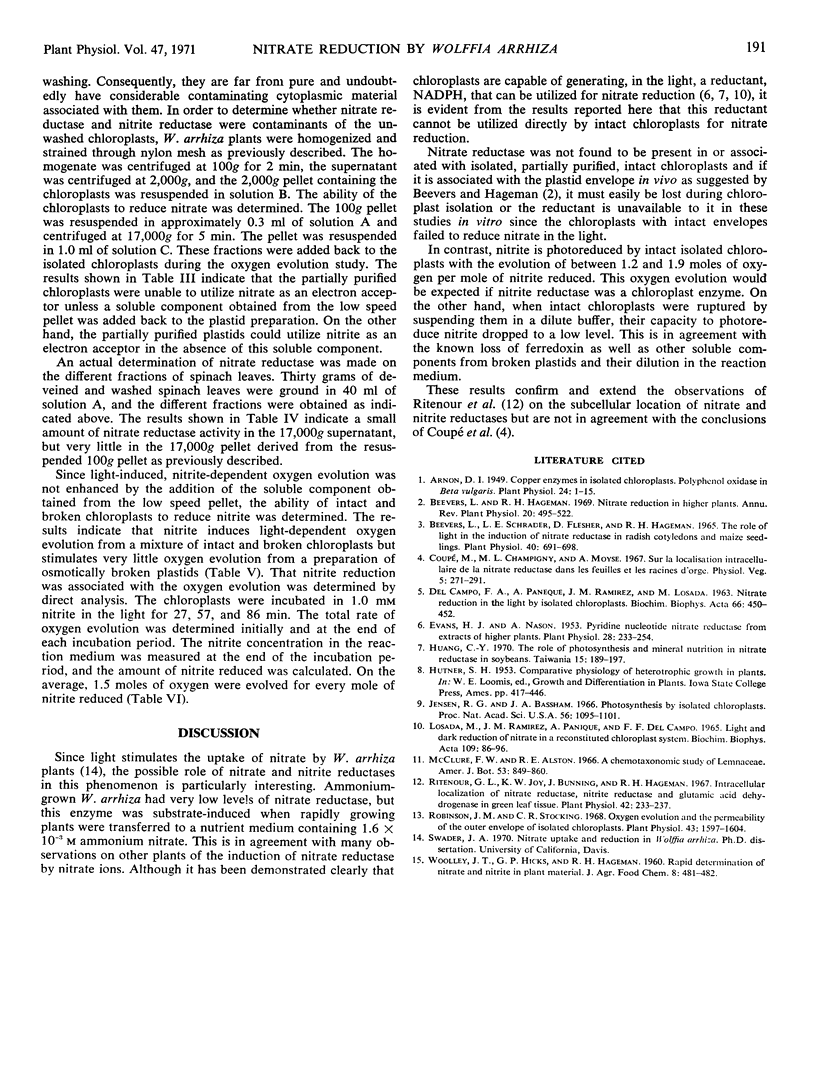Abstract
Nitrate reductase was not found to be present in or associated with partially purified, intact chloroplasts aqueously isolated from Wolffia arrhiza. Such chloroplasts are capable of using nitrite but not nitrate as an electron acceptor during light-stimulated electron transport in the absence of additional cytoplasmic components. When nitrite acts as an electron acceptor under these conditions, on the average 1.5 moles of oxygen are evolved per mole of nitrite reduced by the chloroplasts, indicating a probable reduction of nitrite to ammonia. Chloroplasts ruptured by osmotic shock fail to reduce nitrite in the absence of additional components.
Full text
PDF


Selected References
These references are in PubMed. This may not be the complete list of references from this article.
- Arnon D. I. COPPER ENZYMES IN ISOLATED CHLOROPLASTS. POLYPHENOLOXIDASE IN BETA VULGARIS. Plant Physiol. 1949 Jan;24(1):1–15. doi: 10.1104/pp.24.1.1. [DOI] [PMC free article] [PubMed] [Google Scholar]
- Beevers L., Schrader L. E., Flesher D., Hageman R. H. The Role of Light and Nitrate in the Induction of Nitrate Reductase in Radish Cotyledons and Maize Seedlings. Plant Physiol. 1965 Jul;40(4):691–698. doi: 10.1104/pp.40.4.691. [DOI] [PMC free article] [PubMed] [Google Scholar]
- DEL CAMPO F. F., PANEQUE A., RAMIREZ J. M., LOSADA M. Nitrate reduction in the light by isolated chloroplasts. Biochim Biophys Acta. 1963 May 21;66:450–452. doi: 10.1016/0006-3002(63)91215-0. [DOI] [PubMed] [Google Scholar]
- Evans H. J., Nason A. Pyridine Nucleotide-Nitrate Reductase from Extracts of Higher Plants. Plant Physiol. 1953 Apr;28(2):233–254. doi: 10.1104/pp.28.2.233. [DOI] [PMC free article] [PubMed] [Google Scholar]
- Jensen R. G., Bassham J. A. Photosynthesis by isolated chloroplasts. Proc Natl Acad Sci U S A. 1966 Oct;56(4):1095–1101. doi: 10.1073/pnas.56.4.1095. [DOI] [PMC free article] [PubMed] [Google Scholar]
- Losada M., Ramírez J. M., Paneque A., Del Campo F. F. Light and dark reduction of nitrate in a reconstituted chloroplast system. Biochim Biophys Acta. 1965 Sep 27;109(1):86–96. doi: 10.1016/0926-6585(65)90093-2. [DOI] [PubMed] [Google Scholar]
- McClure J. W., Alston R. E. A chemotaxonomic study of Lemnaceae. Am J Bot. 1966 Oct;53(9):849–860. [PubMed] [Google Scholar]
- Ritenour G. L., Joy K. W., Bunning J., Hageman R. H. Intracellular localization of nitrate reductase, nitrite reductase, and glutamic Acid dehydrogenase in green leaf tissue. Plant Physiol. 1967 Feb;42(2):233–237. doi: 10.1104/pp.42.2.233. [DOI] [PMC free article] [PubMed] [Google Scholar]
- Robinson J. M., Stocking C. R. Oxygen evolution and the permeability of the outer envelope of isolated whole chloroplasts. Plant Physiol. 1968 Oct;43(10):1597–1604. doi: 10.1104/pp.43.10.1597. [DOI] [PMC free article] [PubMed] [Google Scholar]


